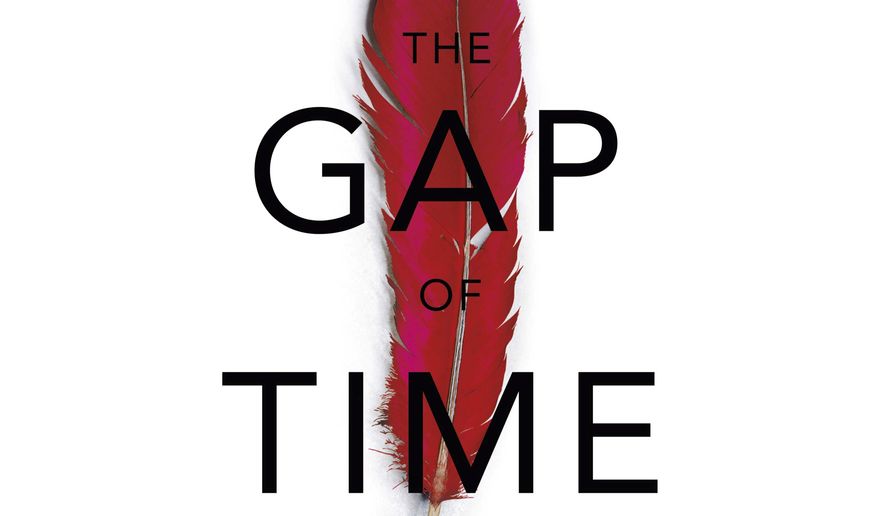OPINION:
Jeanette Winterson’s scintillating, clever The Gap of Time ($15, 273 pages) is the first of the novels commissioned by the Hogarth Press in honor of the 400th anniversary of Shakespeare’s death, each of which takes one of the Bard’s plays and rewrites it as a novel.
“The Gap of Time” is a “cover version” of “The Winter’s Tale,” “a play about a foundling … about forgiveness and a world of possible futures — and how forgiveness and the future are tied together in both directions. Time is reversible.”
Ms. Winterson’s language, while retaining elements of grace and poetry, is contemporary, bold and, at times, brutal.
Leo is a rich London hedge fund “king;” his wife, MiMi, is a French singer and songwriter. Leo is convinced that MiMi is unfaithful and that the child she is carrying is not his but that of his best friend, Xeno, an American creator of computer games.
When the baby girl, Perdita, is born, Leo bids his gardener, Tony, take the child, along with money, to Xeno living in a New Orleans type city. Unable to find Xeno, and fearing a robbery, Tony places the baby in a Baby Hatch — a device outside a hospital where foundlings can be placed rather than leaving them on a doorstep. In a modern version of Shakespeare’s famous stage direction — “Exit, [Antigonus] pursued by a Bear” — Tony is murdered and the baby is retrieved by Shep, a black musician, who raises the “little lost one” as a sister to his son, Clo.
Perdita and Zel, Xeno’s son, fall in love. Xeno has become a sullen alcoholic. When Perdita discovers who she is, everyone goes to London, “[a]nd the story fell out stone by stone, shining and held, the way time is held in a diamond, the way the light is held in each stone. And stones speak, and what was silent opens its mouth to tell a story and the story is set in stone to break the stone. What happened happened. But. The past is a grenade that explodes when thrown.”
Leo is confronted. MiMi (who has been living as a recluse in Paris) is reunited with her daughter, and all is forgiven, with Ms. Winterson leaving open the question of whether there is a “happy ever after.”
It is the act of forgiveness which reverses the gap of time created by Leo’s mindless jealousy, reminiscent of Othello’s. But while Othello’s crime results in despair, Leo’s ends with hope.
Vinegar Girl ($25, 237 pages) is Anne Tyler’s version of “The Taming of the Shrew,” which although fun, lacks the vitality of “The Gap of Time.” Kate Battista is more victim than shrew, a competent teacher who runs her widowed scientist father’s household. Her teen-aged sister, Bunny, may be boy crazy, but she is not Shakespeare’s selfish Bianca.
When Dr. Battista’s treasured Russian lab assistant, Pyotr, needs a miracle to renew his green card, Kate is cajoled into marrying him. “Don’t you think I’m worth more than this? I shouldn’t have to go through with this! I deserve to have a real romance, someone who loves me for myself and thinks I’m a treasure.”
The pro forma arrangement turns into a love match, and although Pyotr has none of the charm and sex appeal of Petruchio, he does love and treasure Kate.
Anne Tyler’s Kate would never “place [her] hands below [her] husband’s foot,” but she does acknowledge that “It’s hard being a man … They’re a whole lot less free than women are,” and like Shakespeare’s Katharina, she has no trouble obeying when Pyotr says “Kiss me, Katya.”
Shylock Is My Name by British author Howard Jacobson ($15, 275 pages) is a different kettle of fish, a thought-provoking, complex discussion of what it means to be a Jew, while also a mordant, darkly comic novel.
In a Cheshire cemetery, Simon Strulovitch, “a rich, furious, easily hurt philanthropist with … a distinguished collection of twentieth-century Anglo-Jewish art and old Bibles, a passion for Shakespeare” meets and befriends Shylock, “an infuriated and tempestuous Jew.”
Shylock is Shakespeare’s character from “The Merchant of Venice,” as interpreted by Mr. Jacobson. Shylock voices the indignities, humiliations and ridicule he suffered. Both Jews have daughters who turned their backs on Judaic traditions and ran off with Gentiles.
Strulovitch’s 16-year old daughter, Beatrice (“A magenta spray of hair, her glance a gleam of mulberries, words like plums in syrup”) has run away to Venice with Gratan, a several times married footballer “with a weakness for Jewesses.” The liaison was arranged and manipulated by spoiled heiress Plurabelle and her friend, D’Anton, a well-traveled French-Guinean importer and lover of beautiful things.
Strulovitch wants either his daughter’s return, or revenge by having the footballer circumcised. D’Anton, who desired to buy a painting owned by Strulovitch, offers himself, should the footballer not return with Beatrice.
There being no “news from the Rialto,” Strulovitch insists on his revenge. This time it is Shylock who urges that “the quality of mercy is not strained.” Revenge takes a twist and Strulovitch is humiliated, but unlike Shakespeare’s Shylock, is not punished and accepts his humiliation with a gracious gesture.
• Corinna Lothar is a Washington writer and critic.




Please read our comment policy before commenting.